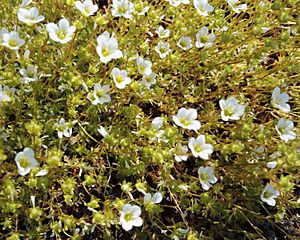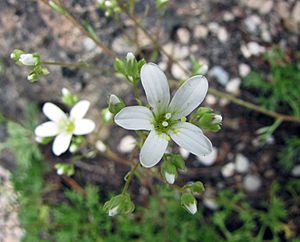Saxifraga hypnoides facts for kids
Quick facts for kids Saxifraga hypnoides |
|
|---|---|
 |
|
| At the Botanical Garden of the University of Fribourg | |
 |
|
| Close-up of flower | |
| Scientific classification |
|
| Kingdom: | Plantae |
| Clade: | Tracheophytes |
| Clade: | Angiosperms |
| Clade: | Eudicots |
| Order: | Saxifragales |
| Family: | Saxifragaceae |
| Genus: | Saxifraga |
| Species: |
S. hypnoides
|
| Binomial name | |
| Saxifraga hypnoides |
|
| Script error: The function "autoWithCaption" does not exist. | |
| Synonyms | |
|
List
|
|
Script error: No such module "Check for conflicting parameters".
Saxifraga hypnoides, often called mossy saxifrage, is a cool flowering plant. It belongs to the Saxifragaceae family. People also know it by fun names like Dovedale moss or lady's cushion. This plant looks a bit like moss, which is how it got its common name.
Contents
Meet the Mossy Saxifrage!
The mossy saxifrage is a small plant that grows in clumps. It has thin, green stems and tiny leaves. These leaves often look like they are cut into several parts. When it blooms, it produces delicate white or pale pink flowers. Each flower has five petals. They often have small dots or lines on them.
Where Does It Grow?
This plant is originally from northwestern Europe. You can find it in places like Iceland, the Faroe Islands, Norway, Ireland, Great Britain, Belgium, and France. It likes to grow in rocky areas and on mountain slopes. Sometimes, it can even grow in cracks in rocks! This plant has also been introduced to other parts of the world. These include Czechoslovakia (now the Czech Republic and Slovakia), the Eastern Himalayas, and Tibet.
Chromosome Counts: Diploid vs. Tetraploid
Plants, like all living things, have chromosomes. Chromosomes carry all the genetic information. Most plants have two sets of chromosomes. This is called being diploid. The mossy saxifrage can be diploid.
However, some mossy saxifrage plants have four sets of chromosomes. This is called being tetraploid. In the northern parts of its range, like Iceland and Norway, you'll mostly find the tetraploid form. In the southern areas, like France, the diploid form is more common. Scientists study these differences to understand how plants adapt.
Life Cycle and Reproduction
The mossy saxifrage is a perennial plant. This means it lives for more than two years. It can grow back year after year. It often spreads by forming new shoots. These shoots can root and grow into new plants. This helps it cover rocky areas. Its flowers are pollinated by insects. After pollination, the plant produces small seeds. These seeds can then grow into new mossy saxifrage plants.
 | Dorothy Vaughan |
 | Charles Henry Turner |
 | Hildrus Poindexter |
 | Henry Cecil McBay |

